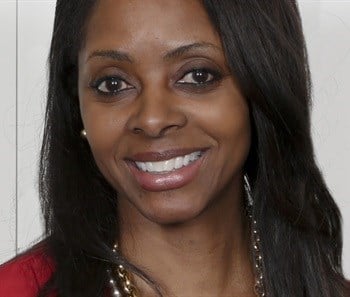
Thomas is an assistant professor at the department of media, journalism, and film at Howard University. Her career has spanned over 25 years in network and local news, and most recently she was a news producer for CNN and an executive producer for CNN Headline News.
Thomas started her talk by sharing with us that Howard University was her alma mater, where she began her career as a student journalist. She has returned to the university to: "inspire the next generation of journalists as they transition from classroom to newsroom to control room to the boardroom, or whatever room it is they wish to occupy."
Thomas told us briefly about one of the most memorable moments in her career, when she was the 9am show producer at CNN on 9/11.
I was in the control room when we heard the thunderous steps of the executives running from the 6th floor down to the newsroom to tell us that something has hit the World Trade Centre. I grabbed my headset as the producer of the show and from there we were off. And you know, hearing the term that 'journalists are the first rough draft of history' - that certainly was an event that changed the history of our world as we knew it. And certainly, for me, as a journalist.She said that as journalists, it is our job to tell stories, adding, "In the world of journalism, certainly for the teaching of these soon-to-be journalists, it's the best of times and it's the worst of times to tell these stories."
She spoke about a news museum in Washington DC, where they update the installations depending on what's happening in the world. There is a wall sponsored by the Press Freedom House that shows world press freedom on a map of the world.
Press freedom is precarious. We want to see countries move from yellow to green, not other way around. #pressfreedom pic.twitter.com/oc80Hf4tU1
— Newseum (@Newseum) September 9, 2017
But recently, they have also added a new section that says: "Journalism in the United States is under threat." She says it has caused so much “friction” with many journalists that The Washington Post changed their slogan last year to: "Democracy dies in darkness."
Thomas said this made her think about what she can say to inspire these millennials who are going into journalism now.
With social media and technology, and with the spread of disinformation, which may be fake news, journalists have to remember to really just get back to the basics, she said.
"If you are in college and you are studying to become a lawyer and you go to law school - in America, you have to pass the bar, and then you hold your hand on the Bible and you swear before a court, before God that you are going to make sure everyone has got access to a fair trial. If you are a doctor and you go to medical school, you have to take the Hippocratic Oath that you are going to try and save a life, no matter what. What do we do as journalists?" She asked the room.
Thomas continued: “I always remind my students that our role is so important that we're embedded in the democracy of the country. We are part of the Constitution and part of the First Amendment. Freedom of speech and freedom of the press.”
The same could be said here, in South Africa, where in both cases when the press is suppressed, democracy dies, Thomas said.
“We don't take that oath so that means that we have to uphold ourselves to make sure that all the stories that we do are done ethically, that we use our resources, that we check our sources, that we verify our sources,” she said.
Thomas then told us about an article she recently read that said that respect and trust in the media is at an all-time low. Right next to lawyers, she joked.
She said there are three things that the media has to do in order to be considered believable and credible. And that is:
1. Tell the truth! Thomas referred to the Sunday Times and said she listened to a lot of conversations around what happened when she arrived in South Africa. She said that as a journalist, you have to fact-check and re-check and verify your sources.
2. It's important to be transparent. She referenced the Sunday Times again and said that she read that the editor of the Sunday Times said that they had made a mistake. She said the question now is, what are you doing going forward? "Certainly, South Africa is not alone. In the US, there are cases that go as far back as the 1980s, where we found evidence of false reporting, false sources. We certainly had to learn the same lessons, but you have to be transparent and then go forward, making sure that those things don't happen again."
3. Making sure the audience becomes not just consumers - allow them to participate in the story, too. This is where social media comes in, helping to get the audience involved. Thomas said we should listen to the audience and also take more time to follow up on stories.
Thomas said stories that stood out for her during her career were always the stories that were linked to the people. There's a saying:
Journalists are the defenders of democracy, the freedom fighters of the First Amendment and savvy and sophisticated storytellers. And I think that if we spend a little more time looking for those stories that are not being told, and focus on the story and not the headline, I think that it'll make all of this a lot better.She ended off by saying, "I think we have to remind ourselves how important we are in a democratic society. And we must just make sure that those stories will tell the truth, despite what's going on around us.”
